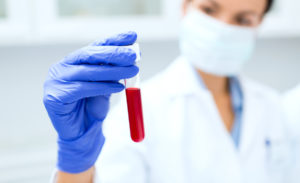The FDA has recently approved the first blood test that indicates the presence of bleeding in the brain from mild traumatic brain injury (TBI). This new test is intended to identify certain patients who do not need imaging to determine whether they have intracranial lesions. According to the FDA, if this blood test is performed within 12 hours of an injury such as a concussion, then it is nearly 100 percent accurate in revealing the presence of brain bleeds. Known as the Brain Trauma Indicator, this test measures the levels of two proteins that are released into the bloodstream after a head injury. These proteins are glial fibrillary acidic protein (GFAP) and ubiquitin C-terminal hydrolase -L1 (UCH-L1). It is currently estimated that approximately 75 percent of traumatic brain injuries are mild TBIs (mTBIs). Most patients who have symptoms of mTBI/concussion undergo a negative computed tomography (CT) scan (Samson, 2018).
 The new FDA-approved blood test predicted whether patients did or did not have intracranial lesions with a high level of accuracy, at 97.5 percent and 99.6 percent of the time, respectively (Samson, 2018). A positive outcome of this test is that less CT scans will need to be performed on patients with concussion, thereby bringing down healthcare costs that are associated with unneeded neuroimaging scans. It is hoped that this novel blood test will be widely adopted by emergency medical professionals, who have relied on CT scans to detect brain injury in emergency settings.
The new FDA-approved blood test predicted whether patients did or did not have intracranial lesions with a high level of accuracy, at 97.5 percent and 99.6 percent of the time, respectively (Samson, 2018). A positive outcome of this test is that less CT scans will need to be performed on patients with concussion, thereby bringing down healthcare costs that are associated with unneeded neuroimaging scans. It is hoped that this novel blood test will be widely adopted by emergency medical professionals, who have relied on CT scans to detect brain injury in emergency settings.
There are a few key advantages of reducing the use of CT scans for detecting mild to moderate brain injury. Since CT scans conducted in pediatric patients induce higher levels of brain radiation, utilizing these scans less often means that this concern can be alleviated for them. Another benefit is that CT scans can potentially become more prevalent for severe head injuries, such as for those who sustain head injuries in the military, where the technology isn’t as widely available. However, the main drawback with this new blood test is the long turnaround time, which is four hours. In emergency rooms, results need to be provided quickly, so this is a challenge that needs to be addressed (Samson, 2018).
Interested in learning more about Alzheimer’s research? Please call 561-296-3824. The Premiere Research Institute in West Palm Beach regularly conducts clinical research studies in the field of Alzheimer’s Disease. To find out more about these studies click here or sign up for their newsletter to keep informed about the newest treatments, articles, and research that are being conducted in the field of Alzheimer’s.
References:
Samson, K. (2018). In the Clinic-Traumatic Brain Injury: FDA Approves First Blood Test for Brain Bleeds After Mild TBI/Concussion. Neurology Today, 18(6), 12-18. doi:10.1097/01.nt.0000532091.01255.0b
